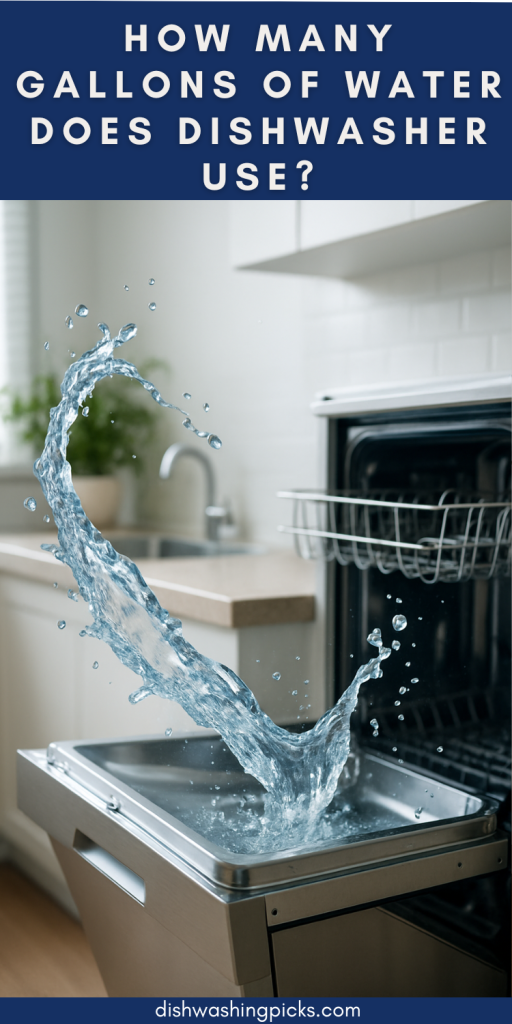
Ever stopped mid-load and wondered, “How much water is my dishwasher guzzling?” You’re not alone. With water conservation becoming a big deal these days, it’s a question worth asking. After all, running a dishwasher sounds way better than washing dishes by hand—less time, less mess. But is it kinder to your water bill and the planet?
So, how many gallons of water does a typical dishwasher actually use? Here’s a quick spoiler: It’s way less than you might think, especially if you’re rocking a modern, energy-efficient model.
The Numbers Game: What’s the Average Water Use?
Older dishwashers (we’re talking models from the 1990s or earlier) could use up to 10-15 gallons of water per cycle. That’s like filling a small bathtub every time you want to clean your dishes. Yikes!
But here’s the good news: modern dishwashers have gotten a serious glow-up. Newer models often use just 3 to 5 gallons per cycle. Imagine that — a fraction of what the old ones did. That’s largely thanks to smarter water jets, better sensors, and eco-friendly settings.
Wait, what about hand-washing? Isn’t that more water-efficient?
Funny you should ask. You might assume washing dishes by hand uses less water because you’re just scrubbing a few plates. But studies show hand-washing can use up to 27 gallons or more depending on how you do it.
If you’re like most of us and leave the tap running, that adds up fast. So, in many cases, running a dishwasher actually saves water.
Imagine this: you run your dishwasher once a day, using about 4 gallons each time. Over a week, that’s 28 gallons total. Now, compare that to hand-washing the same dishes with the tap running—it could easily double or triple that.
What Factors Affect How Much Water Your Dishwasher Uses?
So, what’s behind the numbers? Why do some dishwashers sip water like a fine wine, while others chug it like a marathon runner?
Here are the main players:
- Dishwasher Age & Model: As mentioned, newer models use less water. Energy Star certified dishwashers are designed to be especially efficient.
- Cycle Type: Heavy-duty or pots-and-pans cycles generally use more water than quick or eco cycles.
- Load Size: Running a half-empty dishwasher can waste water. Try to fill it up (without overloading) to get the most bang for your gallon.
- Soil Level: If your dishes are really grimy, your dishwasher might use extra water or longer cycles to get them sparkling.
- Sensors: Some modern dishwashers have soil sensors that adjust water usage automatically depending on how dirty your dishes are.
Practical Tips to Save Water While Using Your Dishwasher
Want to make sure your dishwasher is doing the environment and your wallet a favor? Here are some easy tips:
- Use Eco or Energy-Saving Cycles: These are designed to minimize water and energy without sacrificing cleaning power.
- Skip Pre-Rinsing: Unless your dishes are caked with mud, just scrape off leftovers instead of rinsing under running water.
- Wait for a Full Load: Run your dishwasher only when it’s full to maximize efficiency.
- Maintain Your Dishwasher: Clean filters and spray arms regularly so your dishwasher works efficiently and doesn’t waste water trying to clean clogged jets.
- Choose Energy Star Certified Models: When upgrading, these appliances are tested for low water and energy use.
What About Water Temperature? Does It Affect Usage?
Interesting question! While water temperature doesn’t directly change how many gallons your dishwasher uses, it can affect how well your dishes get cleaned and how long the cycle runs.
Hotter water can clean faster and better, potentially shortening the cycle, which in turn may save a bit of water. But most dishwashers heat water internally to optimal levels, so your home’s water heater temperature doesn’t have to be sky-high.
The Environmental Impact: Why Water Efficiency Matters
Here’s a quick reality check: The average American household uses about 300 gallons of water per day. Every little bit saved helps, especially in drought-prone areas.
By choosing a water-efficient dishwasher and using it smartly, you’re not just saving money—you’re helping conserve a precious resource. Plus, using less water usually means less energy used to heat that water, cutting down your carbon footprint too.
Wrapping It Up: Your Dishwasher Uses Less Water Than You Think
So, next time you’re debating whether to hand-wash or load the dishwasher, remember this: a modern dishwasher usually uses between 3 to 5 gallons of water per cycle, often less than washing by hand.
Try thinking of your dishwasher as your water-saving sidekick, especially if you’re running those eco cycles and loading it wisely.
